The Big Read: Good and affordable babysitters are hard to find – will MSF's childminding services pilot be the answer?
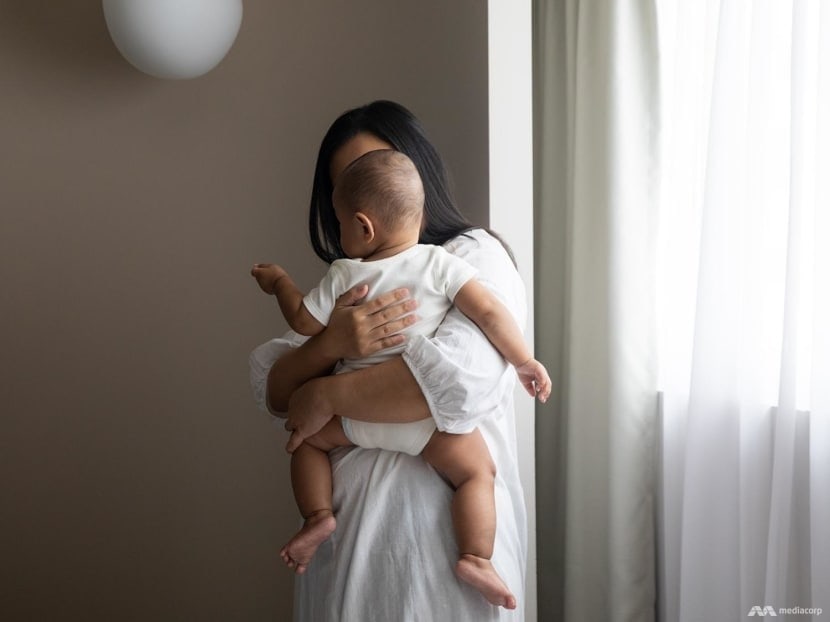
Parents of infants have highlighted that finding sufficient childcare support is a major challenge in Singapore, as infant care centres have few vacancies and some are too costly. (Photo: TODAY/Ili Nadhirah Mansor)

This audio is generated by an AI tool.
SINGAPORE: When her six-month-old baby contracted hand, foot and mouth disease, Ms Joanne Chong turned to Facebook to look for a babysitter who could look after the baby in her own home.
But even though she was prepared to pay the quoted rates, ranging from S$23 (US$17) to S$40 per hour, many of the babysitters she contacted rejected her after learning her child was sick.
The 32-year-old finally found one who was available and willing, and this "truly took a load off" the couple, she said, especially as her husband also fell ill that week.
If it is tough to find an ad hoc nanny, it can be just as challenging to find a spot in an infant care centre, several parents told TODAY.
Ms Belinda Koh, 28, registered her interest online for various centres in her hunt for a vacancy.
Finally, one called her back, but insisted that she confirm her daughter's enrolment within the same day when they had a sudden vacancy, although she had not even visited the centre before.
She managed to visit the centre within the day to have a look around and ask some questions, before calling back to secure her daughter's slot a few hours later.
She had to go through this ordeal even though she had registered her interest for an infant care spot on the Early Childhood Development Agency (ECDA) website around three months before her daughter was born.
"We only received calls from the private centres, whose fees were over S$2,000 monthly before subsidies," said Ms Koh.
Another mom found that looking for an infant care centre for her two-month-old son was an exercise in balancing various priorities.
"My biggest issue was finding a centre close to my house, but even the closest ones were a little out of the way," said Ms Salmah Alsagoff, 34, a lead account manager in the oil and gas industry.
"Because of this, I had to look at locations nearer to my office in the central business district, which can be very pricey."
Many of the centres that she liked were out of her price range at around S$2,000 a month, even after working-mother subsidies.
Eventually, she decided to enrol her son at a centre that had one last vacancy, even though she was on a waitlist at another centre that she was keen on.
"I think it's crazy how you have to start looking for centres before your child is born to secure a slot. I apparently started very late by looking in my last trimester," she said.
Such stories of parents having to undergo frantic hunts for infant or childcare services and finding themselves put on long waitlists, having to pay more than they were prepared to or taking up a less-than-ideal option are rather common in Singapore.
In fact, in the 16-month-long Forward Singapore feedback exercise, many parents highlighted the lack of childcare support in Singapore as a major concern. Many also said the first 18 months of their children's lives were the hardest for them, as they struggled to adapt to juggling work and the needs of an infant.
In an effort to plug the gaps in Singapore's childcare landscape, the Ministry of Social and Family Development (MSF) said it is launching a pilot in the second half of this year, which will introduce a new childminding service for parents with infants aged two months to 18 months old.
The three-year pilot aims to cater to 500 infants in its first year.
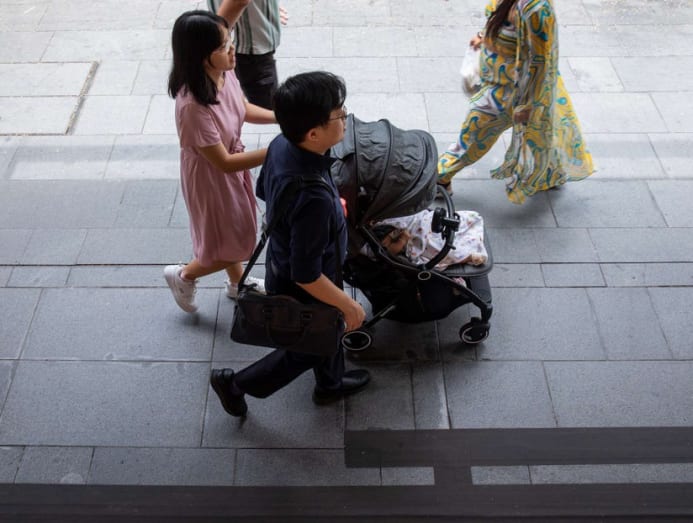
Appointed childminding operators under the pilot will receive funding from ECDA to keep their fees similar to what median-income families pay for infant care at anchor operators, around S$700 a month.
The government will also allow parents to tap the Child Development Account - a special savings account for children that can be used to pay for preschool and healthcare fees - to further defray the cost of such services.
Under the pilot, the service will be available only during weekdays and working hours.
In response to TODAY's queries, an MSF spokesperson said that catering to parents outside typical working hours would involve "additional challenges" such as ensuring that there are childminders available to provide services for extended hours, at night and on weekends.
"After the pilot stabilises, MSF will assess demand and look into the feasibility of catering to parents with varying care needs," the spokesperson said.
MSF added that it is looking into requiring childminding operators on the pilot to offer services in either half-day or full-day blocks and introducing a minimum number of stipulated hours that parents must use the childminding services per month.
This approach is meant to provide childminders and parents with "greater certainty and reliability" in terms of service provision, and parents will still have some flexibility in terms of the total number of days they use per month, said MSF.
CHILDMINDING: COSTLY, UNREGULATED
Single mother Ria, 19, had to withdraw her now 16-month-old son from infant care as the location was too far from her workplace.
Through her family service centre, Ms Ria, a medic with a private ambulance company, was referred to Daughters of Tomorrow (DOT), a local charity focused on supporting underprivileged women in being financially independent.
DOT offers childminding services to lower-income families at affordable rates and assigned Ms Ria a childminder at a rate of $5 an hour.
Ms Ria has become a big fan of the service: Childminding gives Ms Ria the flexibility of picking up her son even when she ends work slightly late, as compared with infant care centres that have strict pick-up times and typically charge parents late fees.
But while non-governmental organisations such as DOT offer cheap childminding services, these are only for lower-income families.
Professional childminding operators told TODAY that for others, engaging a nanny or babysitter on a regular basis can cost up to S$3,500 a month.
In response to TODAY's queries, a spokesperson from the Ministry of Social and Family Development (MSF) said monthly fees for childminding services range from around S$1,200 to S$2,800.
Ms Apple Tan, 32, said she would appreciate the individualised attention that her son could get with a nanny, but engaging a childminder is too costly in the current market.
"Nanny care at S$3,000 a month is too expensive for a middle-income family like mine. If parents engage ad hoc nanny services, it can cost up to S$25 an hour, so for a full day it would easily be S$300, if you hire the nanny from 7am to 7pm," said the IT business analyst.
Furthermore, existing childminding services are unregulated.
Dr Mu Zheng, an assistant professor at the Department of Sociology and Anthropology at the National University of Singapore (NUS), said this is one reason why most parents here either depend on family members, engage the help of domestic workers or enrol their kids in infant and childcare centres instead.
"Singaporean parents may trust childcare more to family; when familial support is not well available, they refer to more mature and well-professionalised arrangements such as childcare centres," she said.
"It will take more infrastructural and administrative development for childminding to be well-trusted and used by Singaporean parents," added Dr Mu.
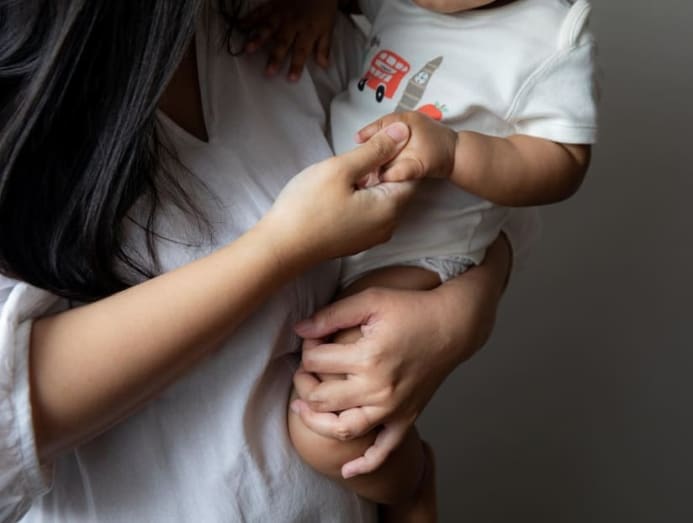
On the Aunty app, all sitters undergo a screening process through which their identity cards are verified. They are then checked for any previous criminal record and have to fill out an application form where they have to detail their childcare experience and certifications.
A phone interview is also conducted to assess their personality and communication skills, and Aunty actively monitors reviews of bookings and tracks babysitters' reliability ratings, and those who fall short will be removed from the app, said the platform founder Ms Amanda Ong.
TIME FOR NANNIES TO MAKE A COMEBACK
In her speech announcing the MSF childminding pilot, Minister of State for Social and Family Development Sun Xueling noted that childminders - more often known as babysitters or nannies - were more common in Singapore in the 1970s and 1980s.
These nannies looked after a few children in their own homes or travelled to a family's home to care for a child.
"They are less common today as parents may be unsure of where to look for trusted childminders or they may find childminding relatively more expensive as compared to other caregiving options, such as infant care centres," said Ms Sun.
Dr Tan Ern Ser, a sociologist from NUS, said that the higher educational attainment and labour force participation of women would have also decreased the supply of childminders.
Other experts cited the plethora of infant care options available today.
"In the 70s and 80s, parents did not have the choice of placing their infants in structured infant-care centres like today," noted Dr Cynthia Lim, the head of the Bachelor of Early Childhood Education programme at the Singapore University of Social Sciences (SUSS).
Infant care centres were only set up in the last 20 years or so, she pointed out.
And such centres have become more popular as they are subsidised, and working mothers get additional childcare subsidies, noted Ms Priscilla Tay, DOT's programme development and incubator manager.
In countries such as Australia and the United States, however, home-based care models are state-supported.
National childcare subsidies in these countries extend to home-based services, and childminders have to undergo regular training and safety checks.
It is time for Singapore to adopt a similar approach, experts said, as the need and demand for more flexible care arrangements has increased.
The option of childminding services would also be a boon to those who might not want to send their babies to an infant care centre, where they are exposed to many other children while their immunity is still weak.
Dr Lucy Quek, dean of curriculum and programmes at the National Institute of Early Childhood Development, added that childminders are known to offer extra services, such as sending the children to the doctor for vaccinations or common cold and flu consultations, services which would not be feasible for an infant care centre to provide.
Childminders can also provide customised one-on-one care, tapping their specialised experience.
Childminders told TODAY that their credentials range from their personal experience as parents to their background in early childhood education or the healthcare sector.
Twenty-year-old Ow Fu Yang, a nursing student who is also a registered babysitter on childminding platform Meide, said offering ad hoc childminding services has provided him with a chance to upskill and learn more about caring for children.
Mr Ow, who is waiting to enlist in National Service, worked for a year in a paediatric ward in a public hospital and brings his experience with basic infant care, first aid, food safety and hygiene to his role as a nanny.
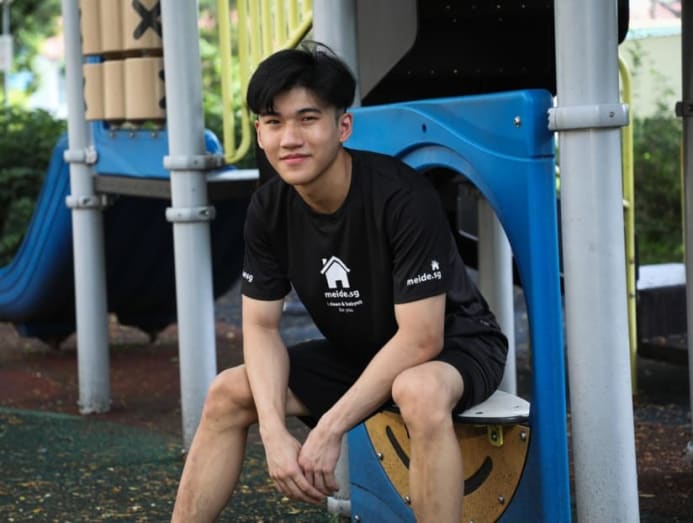
Madam Cecilia Jacob, 56, who also has a background in early childhood education and joined childminding company NannyPro this year, currently cares for a six-month-old at his parent's house.
She follows a customised curriculum provided by the baby's mother, which involves training the child's motor skills and visualisation skills, such as with stimulus cards.
What childminding services already exist?
Some childminding operators directly assign or act as intermediaries to connect caregivers from their pool of staff with parents.
Other operators serve as platforms that facilitate direct connections between parents and childminders.
Kidibliss provides on-demand care services for children aged two months to 12 years old.
Kidibliss will send a staff childminder's profile to parents and arrange a Zoom session for parents, the childminder and the agency to discuss the child's needs and requirements. It also offers corporate childminding services.
Fees for advance nanny care start at S$800 per month for six-hour blocks per day at a nanny's home.
Another company, NannyPro, assigns trained nannies to provide regular or part-time care at the family's home. Rates for a regular nanny for 20 weekdays of nine hours a day are between S$2,900 and S$3,500.
NannyPro also provides ad hoc services at a day rate of S$27 per hour during non-peak periods (weekdays before 6pm) and $35 per hour on weekends, for the caregiving of one child.
Additional costs apply if there is more than one child to be cared for and on public holidays. There is also a 20 per cent surcharge for urgent requests within 48 hours.
Then there is Meide, which matches vetted babysitters on its platform with parents. Users pay a one-time platform fee of S$98 and the babysitters’ salary, which can range from S$8 to S$30 per hour.
NannySOS, a professional confinement agency in Singapore, also offers babysitting services, beginning at S$25 per hour for ad hoc requests and at S$800 per month for a regular weekday daytime babysitter at the nanny's house.
While some parents directly contact childminders over social media such as Facebook groups, there are platforms that enable parents and childminders to directly interact.
Aunty is a mobile application that allows childminders and parents to register accounts, where parents can contact up to five childminder profiles, who can then respond to requests based on their availability.
Of the 13,000 parents registered on its app, more than half have infants below the age of 18 months. The platform has over 600 verified childminders.
While rates depend on factors such as duration of care needed and specific requirements from families, they are on average S$20 to S$25 per hour at Aunty, said its founder Amanda Ong.
Another platform is Babysits, a Rotterdam-based international babysitting platform where users can sign up either as a babysitter, nanny or childminder or as someone looking for a babysitter.
In response to TODAY's queries, Babysits said that it has more than 5 million users worldwide. It has 2,236 active babysitters and 987 active families in Singapore since entering the market in 2018.
Parents and babysitters can each quote their own rates on their profiles. Parents in Singapore offer an average of S$17.96 per hour, while babysitters ask for around S$17.55 per hour.
WHO MINDS THE MINDER?
Parents told TODAY that the safety standards of the MSF pilot is their top concern, not least because of a recent spate of high-profile abuse cases that have occurred at preschools.
Ms Deborah Dayani Nanayakara, 39, a mother of two eight-month-old twin boys and a two-year-old daughter, said such cases have made her extra cautious, and the fact that the childminding industry is currently unregulated means that childminding is her "last option".
Her twins are currently in infant care, while her daughter is in a playgroup.
Even though MSF has said that background checks will be conducted on childminders in the pilot, Ms Dayani said that she and her husband would still prefer to approach family first or trusted friends if they ever need additional help outside of a school structure.
"Also, the cost of this service is too expensive, in our opinion. We pay similar costs for the twins to be in infant care but we know that they have activities that the teachers do with them to build their language and motor skills, ensure that they are hitting their developmental progress when they are in school," she said.
Ms Justine Ong-Farmer, 31, a homemaker and mother of two, is also "very sceptical" as to how the safety of care provided by childminders will be regulated under the pilot, especially in a home setting.
Under the pilot, childminding services will take place either at the childminder's residence or at a "community space" such as a community centre.
"I find it hard to entrust other people to care for my children - especially this young - unless they are family," Ms Ong-Farmer said.
"Looking after children can be so rewarding but the days are also filled with many frustrating and infuriating moments. It makes it a bit easier if they are your flesh and blood."
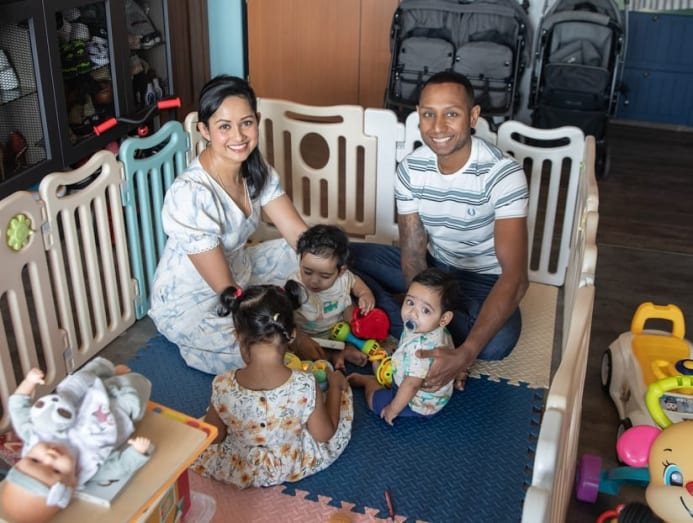
Ms Katie Tan, a 35-year-old working in the healthcare sector who engaged a babysitter under Meide, also expressed concern that having infant childminding at a community centre, which is an "open space", would run the risk of children getting sick often, as they are prone to in group care settings.
Many parents and babysitters interviewed also suggested the mandating of closed-circuit television in the childminding settings. This would not only provide parents with peace of mind, but also offer nannies some protection to avoid miscommunication in the case of any incident, they said.
Mr Andrew Ng, 29, a creative lead in the parenting sector and parent of two, said that the fact that MSF will allow childminders under the pilot to care for up to three infants at a time is concerning.
"Currently, in infant care, if one (carer) is on break, there will be another who can cover her," he noted.
Agreeing, Ms Uni Tan, a 31-year-old freelance babysitter, said that she mainly provides one-on-one care.
"The (proposed ratio) is not very ideal, because in a school there's more than one teacher but in a house setting there's only one minder. So what if something happens, like a fire, if a child falls or I need to attend to one child, if I need to cook or prepare food?"
Dr Rebecca Chan, a lecturer from NIE's Psychology and Child and Human Development academic group, agreed that the preferred ratio of caregiver to infant would be 1:1, as a consistent caregiver can devote more attention and build a strong bond with an infant.
"Taking care of an infant is rewarding but also a back-breaking, intensive, full-time responsibility that requires dedication, patience and a considerable amount of physical and emotional energy towards feeding, diaper changes and comforting, sensory stimulation, interaction and learning," she said.
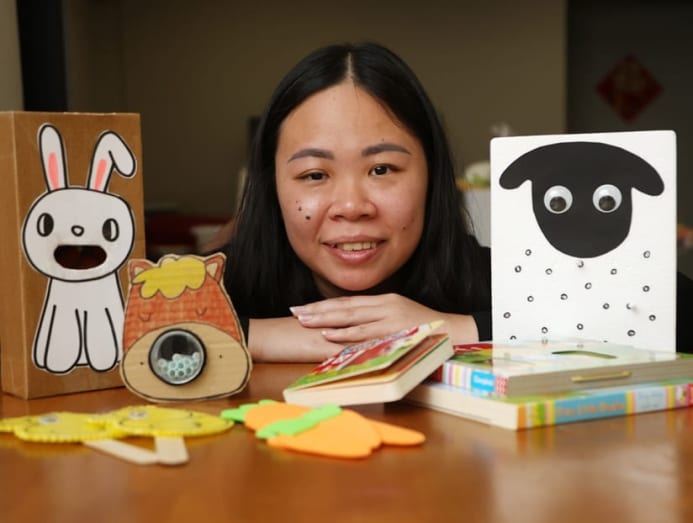
Other regulations that parents said they would like to see implemented in the pilot:
- Child-proofing of childminders' homes
- Spot checks
- Regular training for childminders
- Psychological evaluation of childminders during the screening process
- Guidelines to ensure childminders help babies meet their developmental milestones
- An immediate alert channel to report incidents such as suspected abuse
MSF has said it will collaborate with appointed childminding operators to ensure "baseline service standards" and establish industry standards for childminding.
ECDA will conduct background checks on operators and childminders, including assessing the suitability and homes of childminders, disclosing their profiles to parents and establishing processes for incident management.
Childminders will have to undergo required training in areas such as basic infant care, first aid, food safety and hygiene, and ECDA will check if they have any criminal history, such as child-related offences.
MSF also said it will also look into extending background checks to those who have regular access to a childminder's home, such as their family members.
THE WAY FORWARD
Ultimately, establishing a relationship of trust between the caregiver and parents is critical to ensure the pilot takes off, said Dr Lim from SUSS.
As handing over one's baby to a stranger is a big and emotional step for parents, Dr Lim said that background checks, proper training and strict safety regulations would go a long way in giving parents enough peace of mind to entrust their babies to a childminder.
Even as such details may be ironed out, others pointed out that the pilot cannot fill all the gaps in the childcare landscape.
For example, Ms Frances Hong, a 25-year-old recruitment team leader, thinks having more affordable childminding options for ad hoc arrangements would be appealing, but the MSF pilot, which will only offer childminding within working hours, does not quite meet her needs.
"Night-time services after 6pm, when we have an important dinner to attend, is probably when I'd engage these kinds of services," she said.
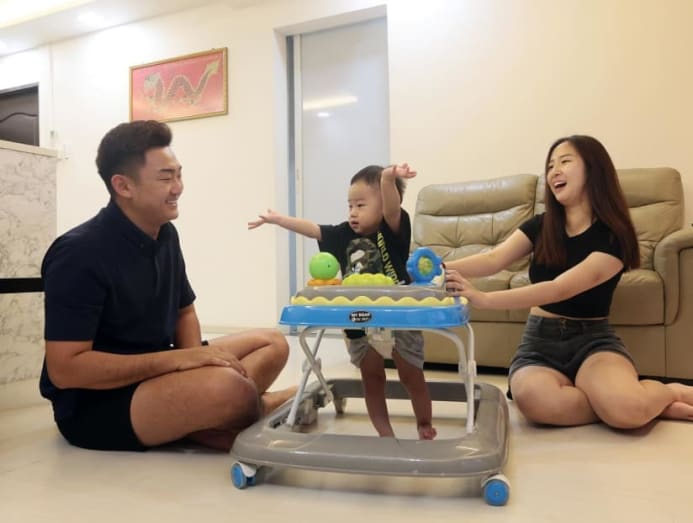
Ms Tay from DOT noted that while the pilot programme is a "good start", it falls short of fully addressing the demands for flexible care arrangements, especially for lower-income women.
"The current pilot, offered only during working hours, may not sufficiently accommodate mothers who work irregular shifts or require childcare outside of standard childcare operating hours," she said, adding that lower-income women tend to be those who work irregular shifts.
Agreeing, senior lecturer in early childhood education Melissa Simin Goh-Karssen from SUSS noted that jobs with more non-traditional schedules, such as shift work and home-based businesses, have resulted in parents having more complex and diverse needs that regular standard infant care structures cannot accommodate.
It also remains to be seen whether there will be ample supply of childminders under the pilot.
Ms Tay noted that there may be potential childminders who might face a barrier to entry into the industry because they lack the financial resources to make their homes suitable enough for childminding services.
"Providing necessary items such as cots, changing tables and play equipment could alleviate this burden, and ensure that childminders have the resources needed to maintain a safe environment for infants under their care," she said.
Beyond the operational details of the childminding service itself, nannies and experts said they hope MSF will see this pilot as a first step towards regulating and professionalising the whole industry.
Ms Pauline Lim, a 50-year-old part-time nanny with NannyPro, hopes that with government regulation and the establishment of industry standards, nannies like herself could earn higher salaries as a result.
This would also help to attract talent beyond the typical demographic of women in their 40s and 50s, she added.
SUSS' Associate Professor Sirene Lim noted that if nannies' home environments are expected to be "more stimulating" for the infants, then their remuneration should match parents' expectations.
As nanny services are expected to have a lower adult-child ratio, in-home care tends to be more expensive than centre-based care in other developed countries, she noted.
Ms Becky Eng, the founder of NannyPro, noted that there is a stereotype that nannies are "uneducated aunties" who have no other job options.
This is a mindset that she has been working to change, she said.
"It's a dignified profession. I onboard all our nannies with our suite of training, not just the basic care of the baby where you just change them and feed them," she said.
"Parents' expectations have evolved, and they are looking for more high-value services from a nanny."
This article was originally published in TODAY.












